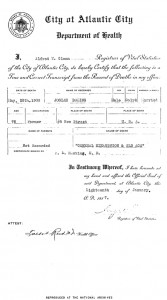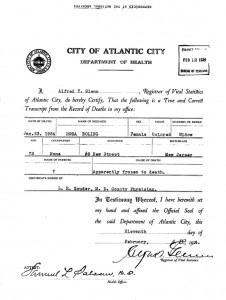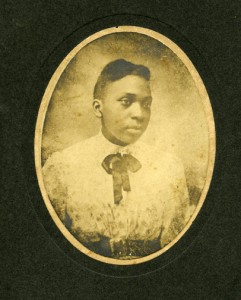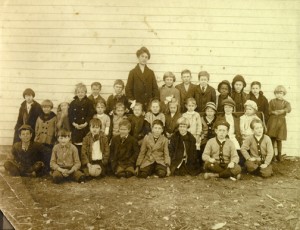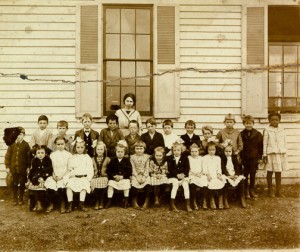Henry Boling, the patriarch of the Boling Family, was born ca. 1790 in Pennsylvania. By 1830, he and his wife, Grace (ca. 1810 – 1885), were a part of the “Free Colored People” of Hamilton Township, NJ. Having moved to Port Republic in 1849, the Boling family lived on or near the future settlement, but it was not until 1857 that Henry bought his first piece of land, thus founding the Boling Settlement. After a long life as a farmer, Henry died on August 18, 1879, at age 89.
Josiah Boling—the first son of Henry and Grace Boling—was born in 1834. In 1860, Josiah expanded the Boling Settlement by purchasing a few acres of land. He joined Co. B, 25th Regiment of the U.S. Colored Infantry and served from January 4, 1864 through December 6, 1865. After the war, Josiah worked as a “laborer” before marrying Rosa Zella Smith on December 30, 1897 and moving to Atlantic City. He was instrumental in the founding of the Ebenezer African Methodist Episcopal Church on the Boling Settlement in 1863. Josiah died on May 28, 1909 of “general exhaustion and old age” with no children.
Rosa Zella Smith was born on March 25, 1849 to Isaac and Elize Ann Smith. Towards the beginning of the Civil War, she moved to Camden to work as a child’s nurse for the family of George Woodhall, then that of Samuel Cooper. After some years in Philadelphia, she moved to Atlantic City in 1880 to work as the nanny for Ella Chamberlain, daughter of Captain Edward Chamberlain. Ella later remarked that she and her family “thought the world of Rosa” and that Rosa was “considerably above the average of her people.” On December 30, 1897, Rosa and Josiah Boling married, though they never had children. Despite being fifteen years her senior, Josiah had known Rosa since her infancy. The two were married for twelve years before she was left as a widow, afterward serving as a laundress well into her seventies, when rheumatism made her unable to continue such work. Rosa Zella Boling died on January 23, 1924, penniless, when—according to her death certificate—she “apparently froze to death.”
Charles Boling was born on February 26, 1840 in Woodbury, New Jersey—the third oldest child of Henry and Grace Boling. Around 1849, he moved with his family to the Port Republic area until the founding of the Boling Settlement in 1857. On January 4, 1864, Charles enlisted in Co. B, 25th Regiment of the U.S. Colored Infantry with his brother Josiah and brothers-in-law James Trusty and Alexander Smith. While in the military, Charles contracted “malignant Southern Fever and Scurvy.” He was treated in Fort Pickens, on Santa Rosa Island, FL. On December 6, 1865, he was discharged while at Camp Cadwalader, PA. Shortly after purchasing land in 1866 from Brevet Brigadier General Elias Wright, Charles built a home, and married Annie Eliza Trusty the following year, working as a “laborer/farmer.” He was instrumental in the founding of the Ebenezer African Methodist Episcopal Church on the Boling Settlement in 1863. In October of 1883, he first applied for a Veteran’s Pension, claiming that dyspepsia had affected his work abilities since the Civil War, being often able to only perform a half-a-day’s work. After a long, hard life, Charles Boling passed away on March 5, 1916 at 1:40 pm in his home in the Boling Settlement.
Annie Eliza Trusty (b. ca. 1847) joined the Boling family in October of 1867, when she married Charles Boling. By this point, Charles already owned his own plot of land, and had sold land to James Trusty, a cousin of Annie and husband to Margaret Boling. Annie Eliza and Charles had five children: Walter (1869), Henry (1871), Samuel (1872), Charlott (1874), and William (1876). In March of 1916, her husband passed away and Samuel Boling was Annie’s only surviving child. Samuel fathered five grandchildren for Annie and Charles. Due to living in “very poor circumstances,” it was necessary for Annie to apply for a widow’s pension—which proved a difficult task. She lived in “enfeebled condition” in the Boling Settlement until her death in 1918.
Alexander Smith was born on October 9, 1833 in Weymouth, NJ. On January 6, 1859, he married Deborah Boling (ca. 1837 – ca. 1892), the first child of Henry and Grace Boling to leave home, moving to Mullica Township, NJ. With his brothers-in-law, Charles and Josiah Boling, and James Trusty, he enlisted in Co. B, 25th Regiment of the U.S. Colored Infantry. Alexander spent much of his enlisted time with bronchitis before his honorable discharge on August 8, 1865. From this time until 1872, Alexander lived in the Boling Settlement and worked as a “Coalyer” before moving to Atlantic City. A coalyer or “collier” is one who supplies coal, in this case probably charcoal for which the area was well known. He was instrumental in the founding of the Ebenezer African Methodist Episcopal Church on the Boling Settlement in 1863. By the 1890s, Alexander was complaining that he had “often been laid up with the pleurisy” as a “result of . . . service in the Army.” Alexander died on February 23, 1910 and is buried in the Boling Cemetery.
James Trusty was born circa 1831 in Maurice River Township, NJ to Joseph and Ruth Trusty. After living in both Galloway Township and Hamilton Township, James married Margaret Boling (ca. 1833 – 1905) around 1854 and resided in the Boling Settlement by 1860. Also enlisting in Co. B, 25th Regiment of the U.S. Colored Infantry, James’ duties included cook, baker, and “Servt.” After the war, however, he returned to his work as a “laborer.” He was instrumental in the founding of the Ebenezer African Methodist Episcopal Church on the Boling Settlement in 1863. James Trusty died in 1903.
Eli Boling—the youngest child of Henry and Grace Boling—was born in February of 1848. Eli enlisted in the Civil War after the others in his family, thus serving in Co. I, 24th Regiment of the U.S. Colored Infantry as a prisoner-of-war guard in Point Lookout, MD, and was discharged on October 1, 1865. By 1880, he was living in Egg Harbor City with a wife and two children. Emma, his wife, suffered from a skin pigmentation disease, which lightened her skin with time. By 1885, she was “to all appearances, a white woman” and upon her death in December of 1896, she was classified as “white.” Through the early twentieth-century, Eli earned a living as a farmer and was active in the Grand Army of the Republic with his son, Frederick “Fritz” Boling. In 1888, Eli began to receive a Veteran’s Pension, which was passed to his second wife, Annetta Mott Boling (m. 1907) after his death in 1925.
Moses Miller was born in 1840 and, like Josiah and Charles Boling, Alexander Smith, and James Trusty enlisted in Co. B, 25th Regiment of the U.S. Colored Infantry. Moses became a permanent fixture in the Boling Settlement following the war, eventually purchasing the Southeast corner of the crossroads in 1884. He was instrumental in the founding of the Ebenezer African Methodist Episcopal Church on the Boling Settlement in 1863. Moses died on January 18, 1905, leaving $10 worth of goods to his daughter, Henrietta Miller-Jones.
“M. Bowling.” The photograph below, identified simply as “M. Bowling” in a Port Republic photo album, portrays either Margaret Boling or Mary Boling, both daughters of Henry and Grace Boling. Margaret Boling (ca. 1833 – 1905) married James Trusty and lived in the Boling Settlement for decades. Mary Boling, Margaret’s younger sister, died in 1867 at age 15.
John and Anne Boling, children of Samuel Boling and Carrie Smith-Boling, attended school in Port Republic, ca. 1910-11. They were the only African Americans to do so.

